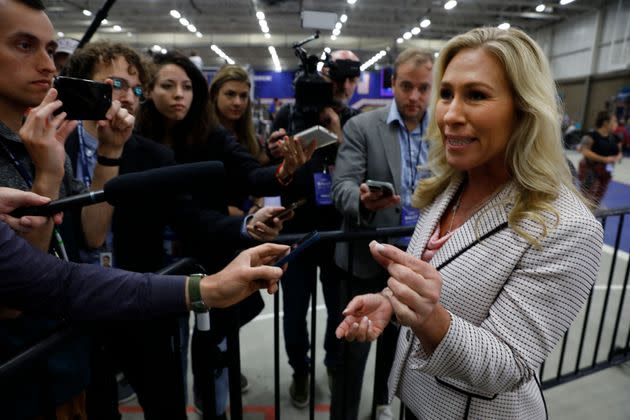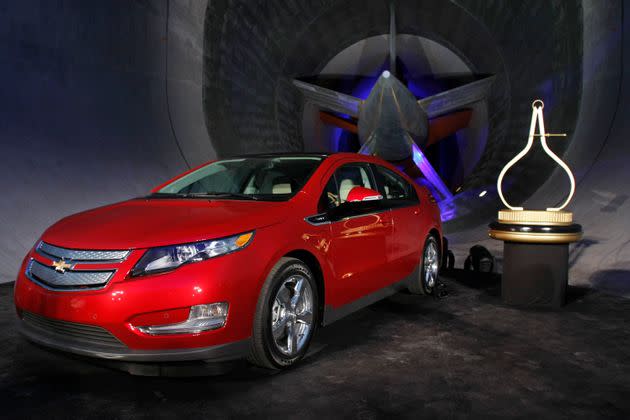What The Weird Conservative Fixation On Electric Vehicles Says About Their Politics
This article is part of HuffPost’s biweekly politics newsletter. Click here to subscribe.
WARREN, Mich. ― Rep. Marjorie Taylor Greene (R-Ga.) was in the Detroit area last Saturday, as part of the road show that former President Donald Trump brings to his political rallies these days. When it was her turn to speak, she decided to take a swipe at Transportation Secretary Pete Buttigieg and the Biden administration’s efforts to support the purchase of electric vehicles.
“Democrats like Pete Buttigieg want to emasculate the way we drive and force all of you to rely on electric vehicles,” Greene said.
The part of the quote that jumped out at me ― and, I bet, jumped out at you too ― is the word “emasculate.” Buttigieg is gay and the word choice, almost certainly deliberate, sounds a lot like an attempt to question his masculinity or attack his sexuality.
If so, it wouldn’t be the first time. Greene has a long history of such comments, as HuffPost’s Josephine Harvey noted this week, including the time she said that “mom and dad have been replaced by Chasten and Pete Buttigieg and their designer babies. Our society is sick.”
But put aside Greene’s not-even-thinly-disguised homophobia, at least for the moment, and focus on the other part of her quote from Saturday ― namely, her attacks on EVs.
This too is familiar territory.
The Biden administration has made support for EVs a top priority. The Inflation Reduction Act, the spending bill that Biden signed over the summer, included new tax credits for people who purchase EVs as well as businesses that open up charging stations. Greene has been critical of this effort from the get-go, and in February posted a 21-part tweetstorm calling the Biden plan ― which, at that point, was still under discussion ― “a one way ticket to hell.”

Rep. Marjorie Taylor Greene (R-Ga.) talks to reporters before former President Donald Trump speaks at a "Save America" rally in Warren, Michigan, on October 1. (Photo: JEFF KOWALSKY via Getty Images)
Greene isn’t alone in making these sorts of arguments. On the contrary, the list of Republican officials who have attacked the Biden administration’s EV agenda in similar terms is long and includes everybody from Florida Sen. Rick Scott to Texas Rep. Dan Crenshaw.
Opposition to EVs also seems to run deep in the GOP base. A majority of Republican voters (54%) oppose government support of EVs, according to a survey that Pew Research released in August. An even larger majority (67%) said they were unlikely ever to buy one.
And while the Republican critics of EVs make arguments about policy, like suggesting the tax credits will only help wealthy car buyers or that they will make America more dependent on China, it’s hard to escape the conclusion that the GOP fight against EVs is as much about culture and tribal identity as it is about the merits of what the Biden administration is trying to do.
To put it another way, the issue for Republicans isn’t what EV policy would mean for them or the country. Rather, the issue is that the policy comes from Democrats.
And yet that’s also where the opposition to EVs becomes a little mystifying, because it’s not at all hard to think of reasons that conservatives ― even the Trump-loving kind ― ought to be excited about EVs.
Three come quickly to mind:
1. EVs are fun to drive.
I happen to know a lot about EVs because I drive one. As I wrote in a HuffPost essay four years ago, our 2018 Chevy Volt is the best car we’ve ever owned. The only rival, really, was the 2015 Volt it replaced when its lease ran out. (We leased the 2018 model as well, but loved it so much we decided to buy it outright when that lease was up.)
The Volt is a plug-in hybrid, which means that it runs initially on a small rechargeable battery and then switches to a more traditional hybrid mode once that battery is depleted. The battery capacity is typically enough to cover our daily driving, which means we can recharge it fully overnight ― and, as a result, go weeks, or sometimes months, without putting in gas.
I’ve never understood why conservatives are so dismissive of these sorts of benefits. Fewer trips to the gas station is awesome. Spending less money on gas is really awesome.
But the appeal of EVs goes beyond fuel efficiency.
They typically have more torque and, as a result, have quicker acceleration. You can see it for yourself by watching the viral video of Biden’s visit to Ford headquarters in Dearborn last year, when he test drove the new electric F-150.
As Biden told reporters, “This sucker’s quick!”
2. EVs reduce dependence on foreign oil.
If Americans are putting less gas in their cars, then there will be less demand for oil ― which, in turn, should mean less dependence on the foreign countries that supply it.
Exactly how much wider use of EVs would reduce America’s oil consumption is impossible to know right now. There are all sorts of projections out there, each with different assumptions built into them.
And at the moment, EV production is heavily dependent on a different foreign input: batteries, the vast majority of which come from China, Japan and South Korea ― a point that Greene, among others, has raised as a reason to stop supporting EVs.

The Chevrolet Volt electric vehicle sits in front of GM's giant wind tunnel turbine engine after it was named Motor Trends Car of the Year at the General Motors Aerodynamics Lab November 16, 2010, in Warren, Michigan. (Photo: Bill Pugliano via Getty Images)
“Democrats want to force Americans to rely on China to drive,” Greene tweeted back in February.
But a major goal of the Inflation Reduction Act incentives is to bring battery production into the U.S., by limiting tax credits for EV purchases to only those vehicles whose parts come largely from the U.S. and whose final assembly took place in North America.
And it seems to be working: In just the last few weeks, following the IRA’s enactment, a slew of major battery manufacturers and car companies have announced they are opening new plants in the U.S.
3. EVs can help create jobs.
One other reason I feel good about my car is that I live in Michigan and it was built at GM’s Hamtramck plant, which is smack in the middle of Detroit. And although GM has discontinued the Volt, that same plant now manufactures other vehicles from GM’s new, quickly expanding all-electric line ― which, just this past January, GM announced would lead to the creation of 8,000 new jobs in the state.
Figures like that don’t tell the full story of how growth in the EV business will affect employment, obviously. And the real story is a bit more complicated than it might sound: EVs have fewer mechanical parts than internal combustion vehicles, which can mean they require fewer workers to assemble and (once on the road) fewer mechanics to maintain.

An artist spray paints a canvas at the historic, 105-year old Michigan Central train station prior to a Ford Motor Company press conference to formally announce their plans to renovate the building and turn it and Detroit's Corktown neighborhood into a hub for Ford's auto technology on June 19, 2018 in Detroit, Michigan. (Photo: Bill Pugliano via Getty Images)
Still, a growth industry is a growth industry, and it’s impossible to look around Michigan and not see the impact. Maybe the most visible symbol is the resurrection of the old, towering and long-abandoned Michigan Central Station in Detroit that had become a widely seen symbol of the city’s decline.
Ford bought the property a few years ago and is now almost finished with a complete restoration project that will turn the building and its surrounding structures into a campus Ford says will be the headquarters of its electric (and automated) vehicle division. The project has potential to do more than add jobs; it could revitalize a whole neighborhood.
And it’s not just Michigan where EVs have potential to create jobs or anchor growth. New battery, parts and assembly plants are popping up in states like Kentucky, South Carolina and Tennessee.
To put it another way: Government support of EVs is already creating new jobs in some pretty conservative parts of the country, and it’s likely to create many more in the future.
That seems like the sort of thing Greene and her allies would support — at least, if they were genuinely focused on how policies affect their constituents rather than whether the policies came from a Democratic administration.
This article originally appeared on HuffPost and has been updated.

 Yahoo Finance
Yahoo Finance 